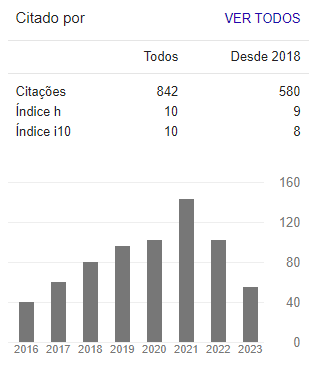Call for Papers FRONTEIRAZ 36: Childhood, Childlike, Literature: Mediations
Organizers
Prof. Dr. Francisco Thiago Camêlo da Silva
Professor at the Postgraduation Studies Program/PPG) of Comparative Studies in
Portuguese Language – USP
Prof. Dr. Maria José Palo
Research Professor – PUC-SP
Cássia Vianna Bittens (Master’s Degree Holder)
On-going Doctorate Studies in Literature and Literary Criticism at the Postgraduation
Studies Program/PPG – PUC-SP
Juliana Mutafi (Master’s Degree Holder)
On-going Doctorate Studies in Literature and Literary Criticism at the Postgraduation
Studies Program/PPG) – PUC-SP






 Este obra está licenciada com uma Licença
Este obra está licenciada com uma Licença 